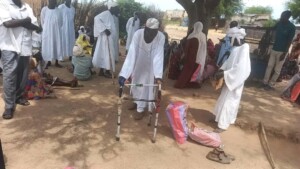Dengue fever declining in eastern Sudan’s Kassala
Dengue fever rates in Kassala last week recorded a marked decline, ranging from 36 to 90 cases per day. Nearly 3,500 cases have been recorded since the outbreak of the disease in early August.
 A residential district in Kassala town (deico.uniss.it)
A residential district in Kassala town (deico.uniss.it)
Dengue fever rates in Kassala last week recorded a marked decline, ranging from 36 to 90 cases per day.
Youth activists reported that the epidemic receded significantly in Kassala locality, while West Kassala still needs more efforts to contain the vector-based disease.
Kassala's Director General of Health, Dr Eman Mahmoud, announced on Thursday that 3,498 cases have been recorded since the outbreak of the disease in early August.
The efforts to combat the carrier will continue, she said. “We need to combine all efforts to eliminate the carrier, the female mosquito Aedes aegypti that settled in the area since 2010. The environmental sanitation needs to be improved and the many rain pools dried, in coordination with the responsible authorities.”
In October, thousands of people protested “the complacency” of the Kassala Ministry of Health and the locality authorities in the fight against dengue fever.
According to the Sudan Federal Ministry of Health, the cumulative numbers of contagious diseases of December 3 are 3,661 dengue fever cases (including 11 deaths), 355 Rift Valley fever cases (11 deaths), 212 chikungunya cases (four deaths), 343 cholera cases (11 deaths), and 52 cases of diphtheria (seven deaths).

The outbreaks can be linked to the recent heavy rainfall in the country that have left large pools of stagnant water, which are breeding sites for various types of vectors such as mosquitoes and houseflies. The rainy season usually lasts from May/June to September/October.
Dengue fever, RVF, chikungunya, and malaria are vector-borne diseases, while cholera is waterborne.
Our editorial independence means that we can continue to provide factual updates about ongoing protests to Sudanese and international actors, educate people about how to avoid outbreaks of infectious diseases, and provide a window to the world for those in all corners of Sudan. Support Radio Dabanga for as little as €2.50, the equivalent of a cup of coffee.












 and then
and then